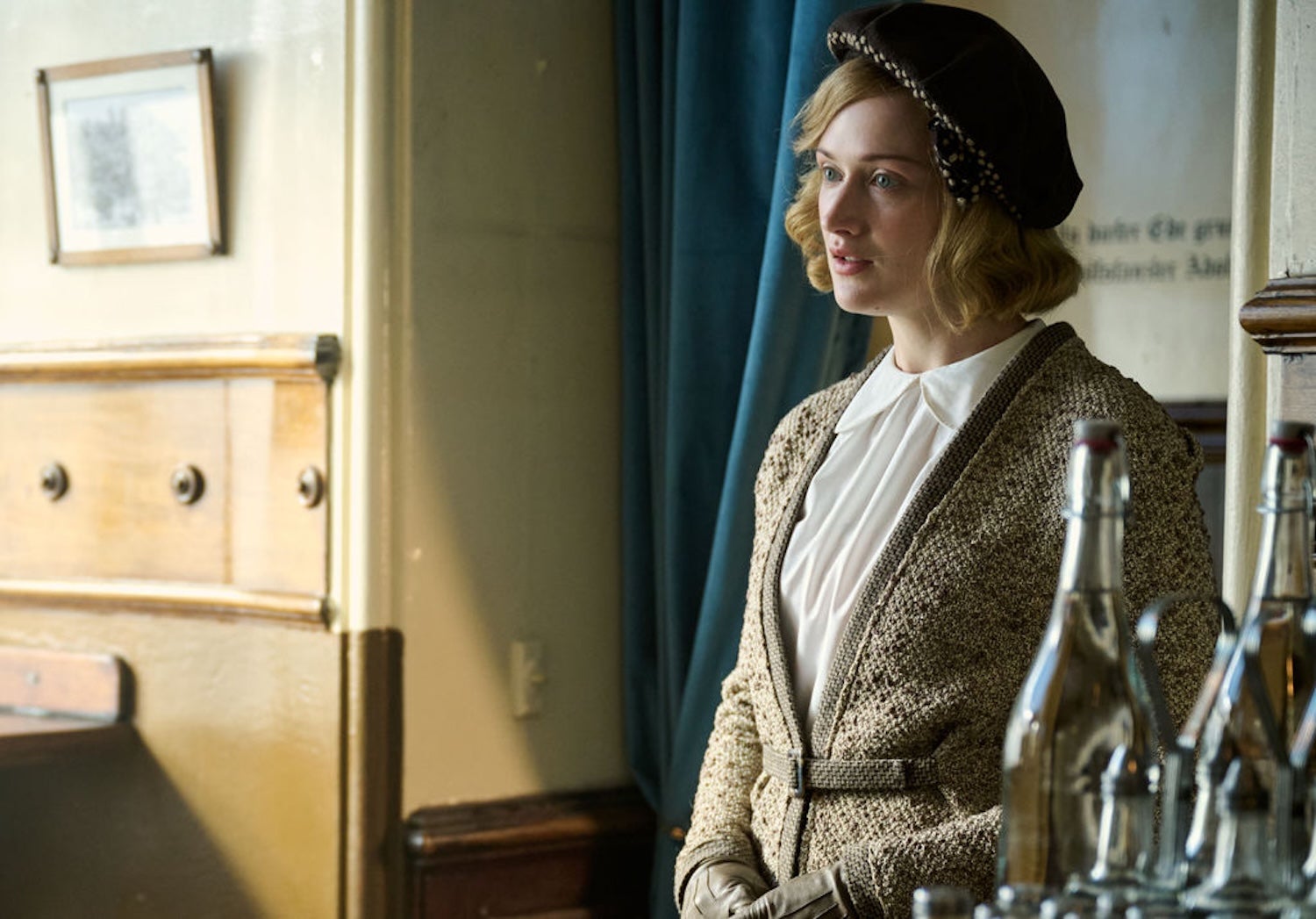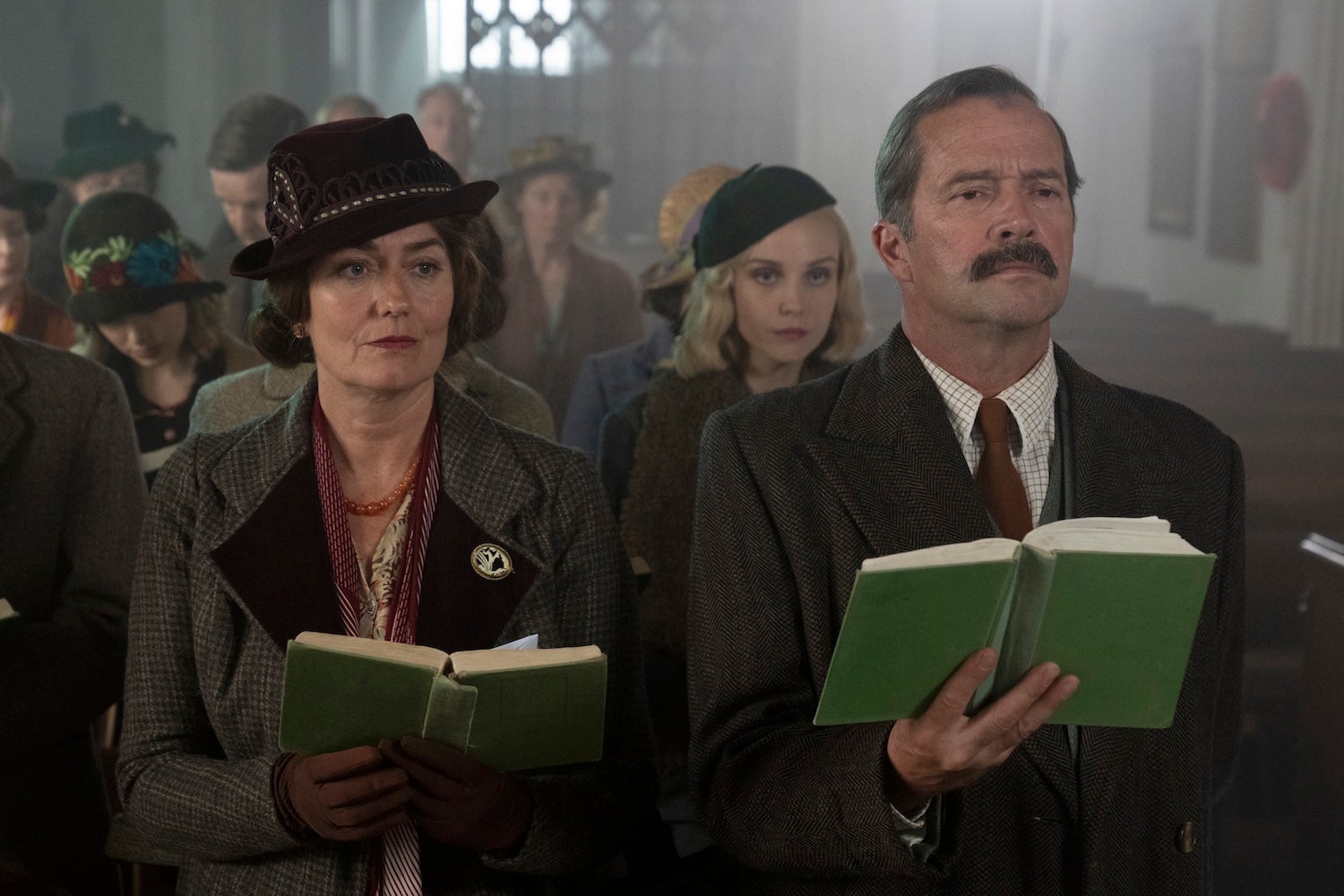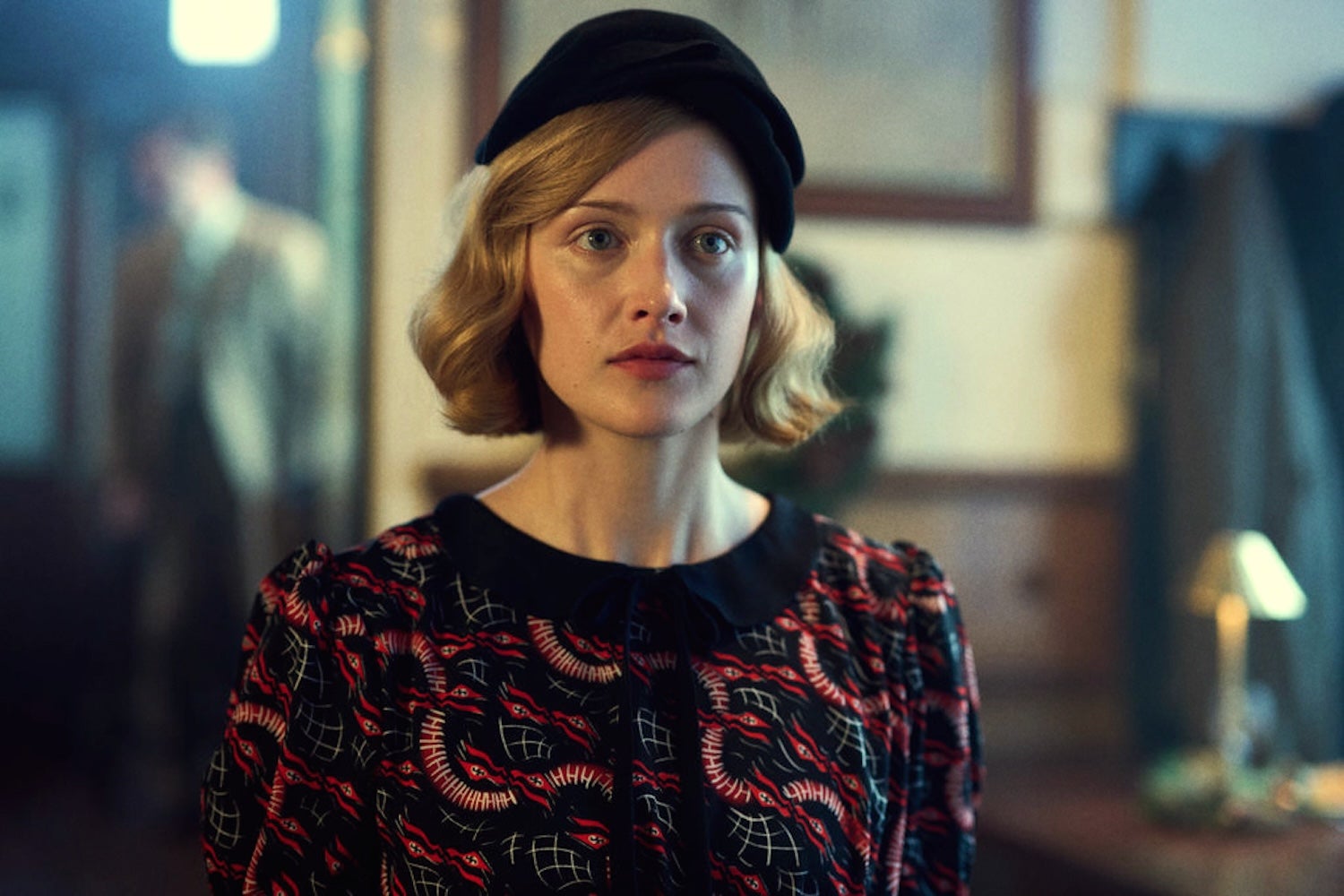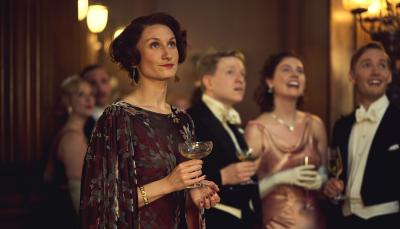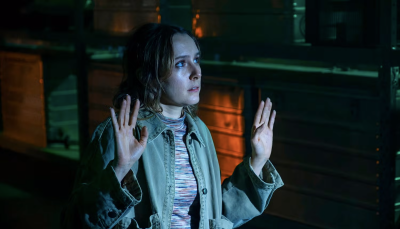Fascism Takes Hold Among the Mitford Family In 'Outrageous's' Third Episode
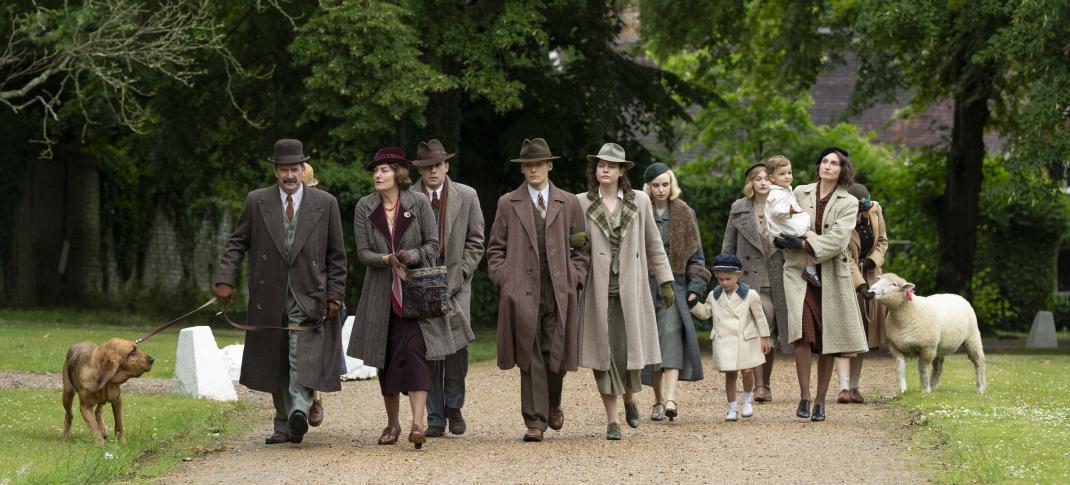
James Purefoy, Anna Chancellor, Toby Regbo, Isobel Jesper Jones, Joanna Vanderham, Shannon Watson, Zoe Brough, Bessie Carter, and Jamie Blackley in "Outrageous"
(Photo: BritBox)
It is March of 1934 as the third episode of Outrageous begins, and darkness is brewing in England, around the world, and within the Mitford family itself. From Nancy and her new husband's financial struggles to an unplanned pregnancy that leaves Diana searching for abortion care, not much is going well for most of the sisters. (Except Deborah, who is apparently a winner by simple virtue of barely appearing onscreen.)
Despite some other vague subplots involving Nancy's marriage and the larger Mitford family's financial woes, the bulk of this third installment is heavily focused on the rise of fascism in Europe during the mid-1930s and how two of the sisters infamously did their best to aid it. On some level, it makes sense for the series to focus so heavily on Diana and Unity's interconnected descents into darkness. They're certainly the most salacious and shocking plots, particularly when compared to, say, the barely-mentioned Pamela buying a car to road trip around Europe. But it's not exactly light and escapist viewing, as Oswald Mosley's rallies descend into violence, Nancy decides her next novel should poke fun at the rise of his movement, and Hitler himself steps onto the stage.
Outrageous does its best to add thematic heft to all the Nazi and Communist stuff by framing it as each of the girls' search for a purpose of their own, and many of them finding that voice in the world of politics. Of course, this whole family is extremely extra, so none of them could just support Labour or something normal, and here we are. But, on the plus side, this hour does a much better job of focusing on characters beyond just Diana and Nancy, and while at least two of the Mitford sisters remain little more than afterthoughts, at least they get a scene or two!
The series' episode opens on Unity doing a series of calisthenics in the family backyard, concluding with a full-on Nazi salute in front of all the neighbors. It's all very awkward and kind of embarrassing, but Nancy, along with most of her family, takes this in stride as another of the faddish obsessions the girl has indulged in for most of her life. Unity, however, is deadly serious about fascism, carving swastikas into church pews and waging a complicated campaign to convince her parents to send her to school in Germany so she can learn the language, meet people, and have discussions about culture and political theory.
(She doesn't strike me as the kind of girl who's ever been into things like political theory before but anything's possible, I guess!)
Shannon Watson is this episode's MVP for many reasons, not the least of which being her ability to make Unity's obsession with fascism more broadly and Hitler specifically feel genuine without coming across as a caricature. To be clear, it's all still 57 shades of horrifying, particularly after she arrives in Munich and essentially begins stalking the places Hitler regularly hangs out at in the hopes of meeting the Führer himself. She eventually snags a coveted invite to his lunch table, and the extended focus on her rapturous expression as she slo-mo walks to the next room is stomach-turning in its intense joy.
It all reads as a particularly gruesome approximation of the similar obsessions girls her age tend to develop around, say, the Beatles or (nowadays) K-Pop stars, uncomfortably relatable and with an undercurrent of disbelief to it. Much like her family, we all want to believe that this seemingly nice, clearly well-brought-up young woman couldn't possibly believe the horrific things Hitler espouses. And yet, we have so much factual evidence that she truly did.
Outrageous is once again judicious in the way it portrays Unity as a character within the world of the series. The real woman was a virulent antisemite who spoke at Hitler Youth festivals and penned a letter to the editor of a German paper that was so offensive that it made the papers back in Britain. (She stood on the balcony with him when Hitler annexed Austria!) Unity was, by all accounts, a monster, and it's to the show's credit that it makes her story compelling. It helps that there's a vague car-crash quality to it all, a how bad can this possibly get vibe that starts with a disapproving family and an ill-advised Nazi obsession and ends, well...in some very dark places indeed. But that's a story for another episode.
Diana, for her part, may not be as strident or outspoken in her fascist tendencies, but her belief is apparently no less sincere. After all, she's thrown over her life to be with Mosley, and is busily scheduling an abortion and sequestering herself at home to avoid causing any whiff of scandal to attach itself to him or slow the momentum of the party. People throughout the country are struggling and seeking change, unhappy with their current situation, and looking for a way to direct that frustration. Mosley's fascists give them a target and, what's worse, revel in the violence that follows. Perhaps all this means Diana is more problematic than her sister is — after all, Unity does little to hide her abhorrent views; she's Sieg Heil-ing every chance she gets. It's Diana who provides a genteel sense of respectability to the whole business, which is just as sickening, albeit in a completely different way.
Elsewhere on the political spectrum, Unity's younger sister Jessica has chosen to take her politics in an opposite direction. She's now as enthusiastically into communism as her sisters are into fascism. At some point, you have to start wondering why none of these girls seems capable of finding a non-political hobby. Jessica's a walking stereotype: lecturing her family about their excesses, stealing cash from the communion plate at church, and devouring tales of Winston Churchill's nephew Esmond Romily, a teen runaway and member of the Marxist British socialist party who campaigned against the public school system and published a book co-authored with his brother about their experiences.
She's as exhausting as her sisters are (the way she looks down at Deborah's dreams of a home and family of her own is particularly irritating). However, her attitude and politics, at the very least, seem slightly less overtly horrifying than those of Diana's or Unity's are.
(There are plenty of fair criticisms to be made of Marxism and the damage it has done in various places around the world, but when set alongside literal Nazisim it's hard not to think, well....at least Jessica's not that.)
Unfortunately, next to this, Nancy's arc feels a bit vapid and shallow. Her story certainly lacks the thematic weight of her sisters, and even though she's ostensibly our narrator, her omniscient voice adds little in terms of overall context or her own feelings about what's unfolding. Instead, her story in this episode is primarily focused on her marital and financial woes, as her husband's continued unemployment decimates their savings and leads to the repossession of their furniture.
In an attempt to staunch the financial bleeding, Nancy starts writing a new novel (it's Wigs on the Green), ostensibly a satire about the rise of fascism in Britain, whose subject matter is sure to upset her siblings. While Outrageous certainly hasn't given equal weight to the relationships between all the siblings equal weight thus far, one of its best is the one between Nancy and Diana. It's Nancy who has helped Diana navigate post-divorce life, helped her through her abortion, and tried to stay neutral about her romance with Mosley. They listen to one another, support one another, and snark together in a way that feels genuine and natural, which is why their fight over Nancy's forthcoming book is so painful.
Granted, part of this is Nancy's fault: She's been doing her best to avoid picking sides in the Great Mitford Family Fascism debate, insisting that her book will just be pointless fluff that no one will read. She assures Diana it won't be that critical of Mosley's movement, even after she attends a Blackshirt rally where violence breaks out. She refuses to state plainly until she's absoultely forced to that her sister's boyfriend sucks and his politics are abhorrent and her attempt to have it both ways is both awkward and uncomfortable. (It doesn't help that she and Paul have already spent her advance, so it's not like she can't not write the book she's already been paid for. As Diana and Unity double down on their fascist ties, Nancy's marriage and career seem equally unstable, and there are obvious hints that the Mitford parents are in some manner of financial trouble of their own. At least Pamela bought a new car?
Outrageous continues with new episodes every Wednesday on BritBox through the end of July 2025.

